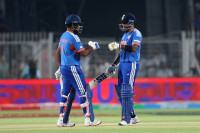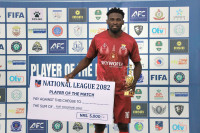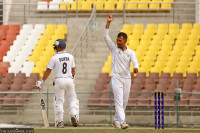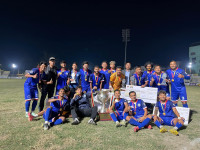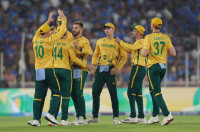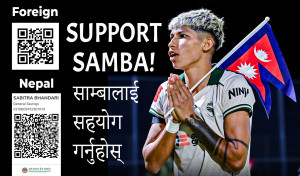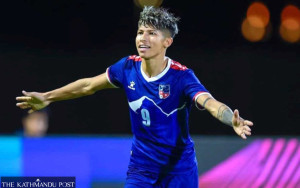Sports
Women players decry lack of infrastructure, state support
Oli had a rather blunt take on the salary of women volleyball players, who get Rs5,000 a month, saying all that was available was encouragement.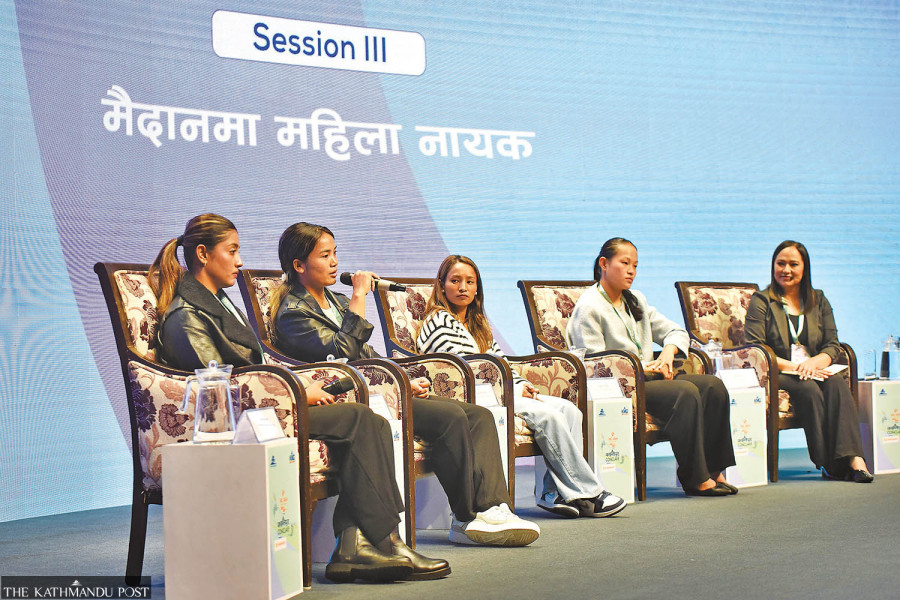
Sports Bureau
On Wednesday, Nepal national U-19 women’s cricket team followed the path of U-19 men’s cricket team and senior men’s team to reach their maiden T20 World Cup. It will be the first occasion any women’s cricket team from Nepal will appear at the global event when the ICC U-19 Women’s T20 World Cup kicks off in January next year.
Last month, Nepal national women’s football team reached their 12th final of a major competition—second of the year and sixth in the SAFF Women’s Championship—but could not win their first international trophy.
In August, Nepal national women’s volleyball team’s bid to win an international trophy at home remained unfulfilled when they lost the final of the CAVA Women’s Volleyball Nations League.
The same month, Para-taekwondo athlete Palesha Goverdhan created history when she won a bronze medal at the 2024 Paris Paralympic Games , becoming the first ever athlete from Nepal to win a Paralympic medal. Last year, Arika Gurung won Nepal’s only third ever silver medal at the Hangzhou Asian Games in China.
Nepali women athletes have shown immense potential that they can go very far in the international competitions, yet they consistently face a lack of essential investment, infrastructure, resources, and support.
“There were high hopes that the women’s team would reach the World Cup before the men’s team,” national women’s cricket team captain Indu Barma said while speaking during a session titled ‘Women’s Champions From The Field’ at the Kantipur Conclave on Thursday. “However, women’s cricket was completely ignored after the Cricket Association of Nepal (CAN) was suspended, which was a huge blow to our motivation.”
Barma, who guided her team to their first Asia Cup since 2016 earlier in July, stressed the need for more focus in the development of women’s sports.
“The cricket governing body has shown commitment to advancing women’s cricket. They have provided us with annual contracts. But this alone is not sufficient,” she added. “Unlike men’s cricket, we lack a proper league like the Nepal Premier League. We have asked CAN to establish a women’s league. It’s their responsibility to create a platform for us to compete, just as it is our responsibility to deliver results.”
The Prime Minister Cup Women’s National T20 Cricket Tournament was the only domestic tournament held for women’s cricketers this year.
National women’s football captain Anjila Tumbapo Subba expressed similar frustration at the event.
“We’ve been labelled as losers. But the concerned authorities need to consider why the national women’s team repeatedly falls short—especially in the final,” Subba said.
“They should assess how far other South Asian teams have progressed compared to Nepal,” Subba added, referring to Bangladesh, who defeated Nepal in the final for a second successive tournament and won the SAFF Women’s Championship for a consecutive time.
In fact, the story of women’s football in Nepal is more depressing than that of cricket.
It was Bangladesh’s second title in their third attempt in the title match at the SAFF competition.
On the contrary, Nepal were competing in the SAFF after only two weeks of preparation and without playing any international friendly matches.
The perception of the world towards the Nepali women’s football has shifted dramatically since their outstanding journey to the final of the WAFF Women’s Championship in February this year. The love for Nepali women’s football was evident during the SAFF Championship, when over 16,000 supporters packed Dasharath Stadium to cheer for them in the semi-final against India and the final. Outdoor screenings were also crowded and online broadcasts also reached record-breaking viewership.
However, All Nepal Football Association (ANFA), the nation’s football governing body, has recently posed the greatest challenges to Nepali football. ANFA has failed to organise the Martyrs Memorial A-Division League—country’s premier league—for more than 500 days now.
Though the women’s league was finally held after a two-year hiatus, ANFA has yet to announce the schedule for the second round. There are even concerns that, as happened in the 2022-23 season, ANFA might declare champions without completing the league.
“It’s ironic that they’ve set their sights on the 2027 FIFA Women’s World Cup when we don’t even have a proper domestic league,” Subba said. “How can they expect results from us under these conditions? We have world-class players like Sabitra Bhandari and Preeti Rai, but with this level of investment and resources, our World Cup dreams will remain out of reach,” added Subba, who recently signed for Greek A-Division club Nees Atromitou, becoming only the second player from Nepal to play in the European league after Bhandari.
Bhandari, Nepal’s all-time highest goal scorer in both men’s and women’s football (53 international goals in 52 appearances), plays for En Avant Guingamp in Premiere Ligue, the highest level women’s league in France.
“I’m not saying that the authorities haven’t done anything—they’ve introduced equal pay, and they’ve put effort into developing women’s football and supporting players,” Subba acknowledged. “But more is needed. With greater support and investment, we could absolutely reach the World Cup soon.”
The situation for women’s volleyball players in Nepal is even more challenging. National women’s volleyball players receive a monthly salary of just Rs5,000, which became possible with the initiative of the Nepal Volleyball Association. In comparison, women’s cricketers earn between Rs20,000 and Rs50,000 through their central contracts, while women’s footballers receive Rs30,000.
“Our salary is very low, but the Nepal Volleyball Association is doing its best for us,” said Salina Shrestha, a national women’s volleyball player. “I hope the government will take our concerns seriously and offer us more financial support.”
“Another major issue we face is the lack of a dedicated covered hall for training,” Shrestha added. “We have to wait for our turn to practice at the National Sports Council’s covered hall. We’ve already asked the government to build us a separate one, and they’ve promised to provide it soon.”
Prime Minister KP Sharma Oli expressed a rather brutal stance regarding the low monthly salaries of women’s volleyball players.
“For now, encouragement is all we can offer,” Oli said in response to a question from Kantipur Editor-in-Chief Umesh Chauhan about the government’s plans to improve support for women’s volleyball players during the session In Conversation With The Prime Minister. “There’s nothing more we can do for them.”
He acknowledged the need to support athletes, saying, “It’s true we should do something for the players. The government has honoured them with rewards from time to time.”
Asian Games silver medallist Gurung said that players must also find motivation within themselves to achieve success.




 9.7°C Kathmandu
9.7°C Kathmandu